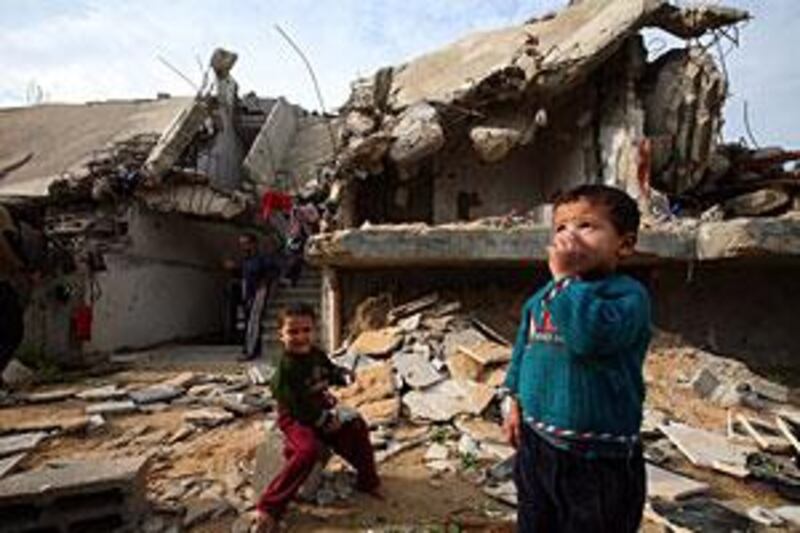TEL AVIV // As the first anniversary of the start of Israel's 22-day attacks last year against Hamas in the Gaza Strip takes place today, both sides are already threatening another round of fighting. Hamas, the Palestinian Islamic group that rules the impoverished enclave, stated this weekend it would not hesitate to engage in more combat with Israel. Abu Ubaida, a spokesman for Hamas's armed wing, was quoted by news agencies as saying: "If any battle is imposed on us, we are ready with all our manpower and equipment to confront any Zionist war, any crime and any attack regardless of scale."
On the Israeli side, Yoav Galant, head of the military's southern command, responsible for the region bordering Gaza, warned earlier this month of a looming confrontation. Speaking at a conference at Israel's Ben-Gurion University, he said the current dramatic drop in rocket fire by Gaza militants on the country's southern communities was a "temporary pause" and added: "Even though it has been quiet, we see the clouds on the horizon and they are ominous. We have to be prepared for the possibility of war."
Continued violence between Israel and the Palestinians may also escalate in the occupied West Bank. Yesterday, the Israeli army killed three militants in the West Bank city of Nablus and another three men in northern Gaza, prompting an aide to Mahmoud Abbas, the president of the western-backed Palestinian Authority, to accuse Israel of "trying to explode the situation". For the 1.5 million inhabitants of Gaza, which has not yet been rehabilitated from last year's onslaught, the bloodiest for years in the long-running Israeli-Palestinian conflict, further hostilities are bound to be devastating.
Israel had launched its offensive, which had involved hundreds of air strikes, mortar and artillery fire and the incursion of several thousand Israeli soldiers into the area, in a bid to quell the rocket fire by Gaza militants onto its territory. But the attacks left more than 1,400 Palestinians dead, including hundreds of civilians, while 13 Israelis - most of them soldiers - were also killed. The military campaign completely destroyed some 3,500 homes in Gaza as well as factories, government buildings, roads and bridges, and had damaged power lines and water and sanitation networks.
A year later, much of Gaza remains in ruins amid Israel's continued blockade on the territory, which includes a near total ban on reconstruction materials such as cement, glass and iron. Israel controls all of Gaza's border crossings except for Rafah, which is managed by Egypt, which typically co-ordinates its opening with Israel. Some 40,000 Gazans still have no electricity and power outages take place eight hours a day, four days a week for most areas of the enclave, according to Gisha, an Israeli human rights group that advocates for Palestinian rights. Furthermore, 10,000 people still have no access to running water.
The impoverished territory's economy has worsened. According to Gisha, 97 per cent of factories remain shut, the unemployment rate has risen to 42 per cent and 80 per cent of the region's inhabitants are dependent on food aid. Late last week, Richard Falk, the UN's special rapporteur on human rights in the Palestinian territories, condemned a "tragic failure" by Europe and the US to end Israel's blockade of Gaza and urged them to consider threatening Israel with economic sanctions should the siege not be lifted.
While Israel's blockade continues to impede Gaza's recuperation, the decrease of rocket fire on its own territory has spurred an economic revival in the towns that had been hardest hit by the rocket barrages. Indeed, some 240 rockets and mortar shells have been fired on Israel since it ended the attacks, about 90 per cent less than during the offensive. In Sderot, a southern Israeli community of 19,000 people, which had appeared like a ghost town during last year's onslaught as hundreds of residents escaped the rockets, is a prime example. In recent months, real estate prices have climbed by about 40 per cent, while demand for apartment rentals has jumped and the construction of a new shopping centre is underway.
But for Israel, the relative calm on its border with Gaza has come hand in hand with international condemnation of the human toll from its attacks. The killing of hundreds of Palestinian civilians had prompted a UN investigative team to accuse Israel of violating international laws on war and deliberately targeting civilians. Israel has rejected the damning report of the UN mission, led by respected South African judge Richard Goldstone, as biased and has engaged in diplomatic efforts to hinder it from reaching the International Criminal Court in The Hague, which could result in the possible prosecution of senior Israeli military and political figures.
Like their government, many Israelis remain convinced that the onslaught was justified, and the country's mainstream media have since barely reported on the damage it has wrought on Gazans. Gideon Levy, a prominent left-wing journalist for Haaretz, a liberal Israeli newspaper, lamented the lack of coverage on Gaza, which he partly blamed on the government's banning of Israeli journalists from entering the enclave. But he also suggested that fellow reporters have opted to be apathetic to the effects of Israel's actions on Gazans, and added: "For more than three years, there has not been an Israeli journalist in Gaza, but there is no sound of protest from the media - Gaza is closed to reporters, but they do not care."
@Email:foreign.desk@thenational.ae





